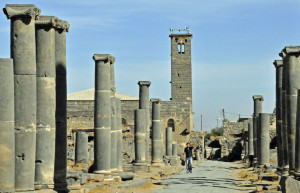The ancient city of Bosra in southern Syria contains the oldest minaret in the world, a square basalt structure apparently inspired by a church bell tower. Bosra is also where Muhammad first came face to face with Christianity, an encounter that probably started him on the path that led to Islam.
Egyptian records from 1400 B.C. refer to Bosra, which eventually came under the control of the Nabateans. The Romans captured the city from the Nabateans, made it the capital of the province of Arabia and built a still functioning 15,000 seat theater. Bosra, on the caravan route between the Red Sea and Damascus, later became an important Christian city, its archbishop participating in the Council of Antioch in 341. The remains of a sixth century cathedral bear witness to that importance.
In 580 A.D., Muhammad, then about ten years old, reportedly stopped in Bosra with his uncle, a Meccan caravan driver who cared for Muhammad after his parents had died. In Bosra, at least according to ancient traditions, Muhammad met with a monk named Bahira, who taught him about Christianity. But the Christianity the young Muhammad learned from Bahira was different from the orthodox version that prevailed further west. Bahira and other Christians in sixth century Bosra were either Nestorians or Arians, who rejected the conclusion that Jesus had been born divine and that Mary was the “Mother of God” and who were considered heretics by orthodox Christians.
Islamic tradition holds that Bahira told Muhammad that he was destined to correct the mistakes of orthodox Christianity about the nature of Jesus. The Quran, which Muhammad said came to him from God, states, “Far be it from His glory to have a son,” reflecting the Islamic belief that the very concept of a son of God, born to a human being, has an unacceptably pagan connotation. So similar are these views to beliefs of sixth century Nestorians and Arians that some scholars speculate that Muhammad became a non-orthodox Christian after his contact with Bahira, noting that Syrian Christians still refer to God as “Allah.”
Today, people still live among the ruins of Bosra, a UNESCO World Heritage site. Loud speakers atop the ancient minaret call them to prayer five times a day, as Muhammad taught. And most visitors remain totally unaware that the roots of Islam may lie in this once unorthodox Christian city and its unorthodox monk.
